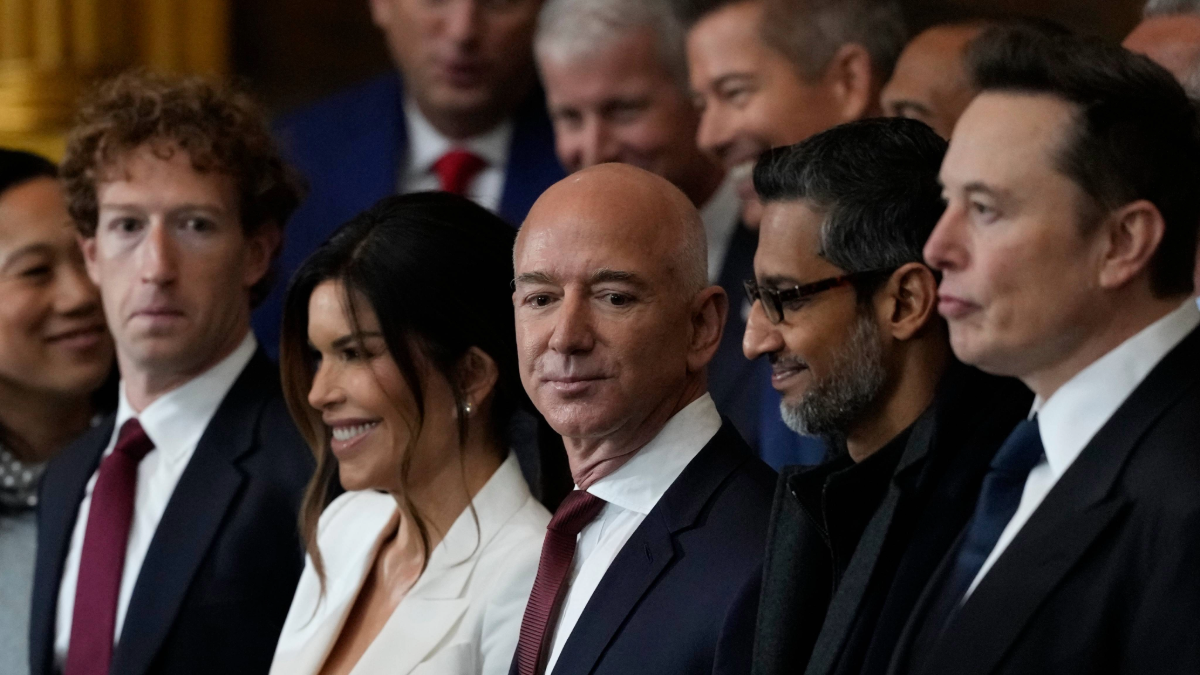Concentration of Power in the Broligarch Era
Andressa Michelotti / Jun 17, 2025This post is part of a series of contributor perspectives and analyses called "The Coming Age of Tech Trillionaires and the Challenge to Democracy." Learn more about the call for contributions here, and read other pieces in the series as they are published here.

WASHINGTON, DC—JANUARY 20, 2025: Guests including Mark Zuckerberg, Lauren Sanchez, Jeff Bezos, Sundar Pichai, and Elon Musk attend the Inauguration of Donald J. Trump in the US Capitol Rotunda. (Photo by Julia Demaree Nikhinson - Pool/Getty Images)
Although most Big Tech companies are publicly traded, decision-making remains in the hands of a few tech tycoons. Specifically in the cases of Meta, Alphabet, and X, platforms that serve billions of users worldwide across various products, these broligarchs hold significant influence over the global online population. They collect, retain, and process vast amounts of user data while making corporate decisions that have profound global social, political, economic, and technological implications.
These platforms have long marketed themselves as tools of democratization, yet their governance structures and decision-making processes are far from democratic. Platform decision-making is tightly controlled by a handful of founders, CEOs, major investors, and financial institutions whose actions are often shaped by personal, financial, political, or ideological motives.
Charismatic and digitally influential, these leaders effectively micromanage operations and maintain outsized corporate voting power through strategic ownership structures. Executives like Mark Zuckerberg, Elon Musk, Larry Page, Sergey Brin (with Sundar Pichai as CEO), and others routinely make top-level decisions, from product launches to content moderation, often through internal escalation channels. Making such crucial decisions from their offices in Silicon Valley or from their jets somewhere around the globe, these technofeudals are part of a new order of power, wealth, and control. While such influence—technological, social, political, and economic—is not new in modern history, the scale and scope of their reach are unprecedented.
From Rockefeller to Musk: Concentrated wealth then and now
From Jan Pieterszoon Coen of the Dutch East India Company to the founders and investors of the British East India Company, powerful individual leaders of European trading companies during the colonial era significantly shaped politics, economies, and societies. Much like today’s tech giants, these early corporate powers prioritized expansion, growth, labor and resource extraction, and data collection and classification. While many of these “colonial-era CEOs” are largely forgotten by the general public, their actions left lasting impacts that continue to reverberate today.
By the late 19th and early 20th century, powerful industrialists and business magnates such as John D. Rockefeller (Standard Oil Company), J. Pierpont Morgan (J.P. Morgan & Co.), Andrew Carnegie (Carnegie Steel Company), Thomas Watson (IBM), and Henry Ford (Ford Motor Company) laid the foundation for modern corporate America and became icons of American capitalism. While these companies initially remained under founder and family control, ownership gradually shifted due to regulation or other factors, ushering in a new era of institutional ownership.
The breakup of Standard Oil’s monopoly led to the formation of several independent companies, such as Exxon, Mobil, Chevron, etc., with Rockefeller retaining significant shares. His descendants continued to influence the firms, including some challenging the environmental effects caused by the oil industry. After J.P. Morgan’s death, his firm transitioned away from family and partner ownership, undergoing structural reforms and later merging with Chase Manhattan in the 2000s. Carnegie sold his steel company to Morgan, which later became US Steel, and chose to retire from business altogether. IBM expanded globally and restructured over time, with institutional investors eventually replacing family influence. The Ford family, however, still controls about 40% of the company’s voting power despite owning less than 2% of the stock.
Private empires in a public world
Thus, personalized power has always been central to capitalist enterprises. The difference today lies in the scale and depth of power concentration. As the owners of information and communication platforms that are now deeply embedded in society, these broligarchs make decisions with a global impact.
Though platforms like Meta and Alphabet are technically considered public companies, power remains centralized in the hands of their founders. At Meta, Mark Zuckerberg holds over 60% of total voting power, giving him control over key product and investment decisions, regardless of whether these decisions align with the interests of shareholders, users, or society at large. At Alphabet, co-founders Larry Page and Sergey Brin still play a critical role in defining the company’s direction. While Sundar Pichai is the de facto CEO at Google, Page and Brin retain over 50% of Alphabet’s voting power through Class B shares, maintaining control via this dual-class structure.
In 2022, Elon Musk took Twitter private, rebranding it as X. It is now controlled by a small group of individuals and institutional investors, including former CEO Jack Dorsey, Prince Alwaleed bin Talal al Saud of Saudi Arabia’s ruling royal family, and investment firms such as the Baron Opportunity Fund and Andreessen Horowitz. Musk exercises near-total control over the platform, operating with little transparency or accountability to users, advertisers, or governments. Whether public (Meta, Alphabet) or private (X), the concentration of power in Big Tech remains strikingly similar: centralized in the hands of just a few individuals.
The structure of corporate governance is key. Corporate legal structures affect everything from leadership transitions to strategic directions. Single-class models are simpler and more transparent, but may leave the company vulnerable to takeover. Dual-class models shield founders from leadership changes, preserving their control over time.
Meta, Alphabet, and X, all employ dual-class shares, which grant disproportionate voting rights to founders and/or CEOs. In contrast, Apple and Amazon use a single-class share structure where voting power is proportional to share ownership.
As a result, at Apple, investment firms such as the Vanguard Group (8.76%) and BlackRock (6.94%) hold significant stakes and have proportional voting power and control, while CEO Tim Cook holds a relatively small stake. Amazon follows a similar model, with major stakes held byJeff Bezos (10.8%), Vanguard Group (7.4%), and BlackRock (6.1%). Since 2021, Andy Jassy has served as CEO, with only a small ownership share. Still, Bezos continues to wield considerable influence due to his significant stake in the company. However, he does not have special voting power in the single-class share model.
The cult of the tech visionary
Beyond corporate legal structures, today’s titans of industry are backed by a niche techbro following, wielding power through a mix of economic, technological, and communicative influence. They control the core infrastructure and streams of global information, communication, and personal data, and shape the trajectory of technological innovation. Through corporate mission and vision statements, as well as strategic narratives, these broligarchs have mastered the art of online communication and personal branding, positioning themselves as visionaries shaping humanity’s future.
Fueled by “moonshot” ambitions, hallmarks of Silicon Valley culture, they make sweeping decisions with little oversight, often treating their companies like personal experiments. As unelected or undemocratically elected figures, they see themselves as the ones who can make the difficult calls and change the world according to their own vision. Like digital influencers, they amass followers who seek to emulate their lifestyles, ideologies, and business philosophies. Despite vast criticism, their cultural, political, and technological reach is undeniably global.
Historical precedents for such influence exist, but not on this scale. Today’s tech elite govern through algorithms and platforms used daily by billions. Much like authoritarian rulers, they dictate the terms of participation in digital life, establish policies, and shape the public discourse, all without democratic accountability.
Companies like Meta may even liken themselves to governments. Zuckerberg once claimed Meta is “more like a government than a traditional company.” Given their reach, he isn’t entirely wrong. The problem, however, is that frequently these tech tycoons place personal ambitions above the public good, producing immediate, far-reaching consequences worldwide.
Certainly, not all platforms are the same, but many share similar patterns of centralized, founder-driven power, often guided by the philosophy of “move fast and break things.” Yet, broligarchs don’t act alone; they are backed by a powerful ecosystem of investors, financiers, and political actors that enable and expand their control.
Wealth is power – but not forever
It’s too early to predict the fate of today’s tech giants. But if history can inform the future, power is never permanent. Colonial enterprises eventually collapsed, and empires fell. The early American industrial giants were broken up or restructured. In some cases, descendants rejected the legacies of the companies they inherited.
As the digital world remains a broligarch’s playground, the demand for transparency and democratic regulation is more urgent than ever. Reducing concentrated power requires a strategic and coordinated approach that includes antitrust and competition laws, reforms in corporate governance, transparency and accountability mechanisms, data privacy laws, international cooperation, and investment in local innovation capable of offering alternatives.
Although it is easy to fall into despair, believing that the power held by these individuals is absolute, unquestionable, and unaccountable, even in the short history of modern tech companies, their behavior has shifted in response to public pressure and changing circumstances. Resistance matters. Users, advertisers, employees, internal teams, the press, civil society, regulators, and governments all play a critical role in holding these figures—and the systems behind them— accountable.
Authors
